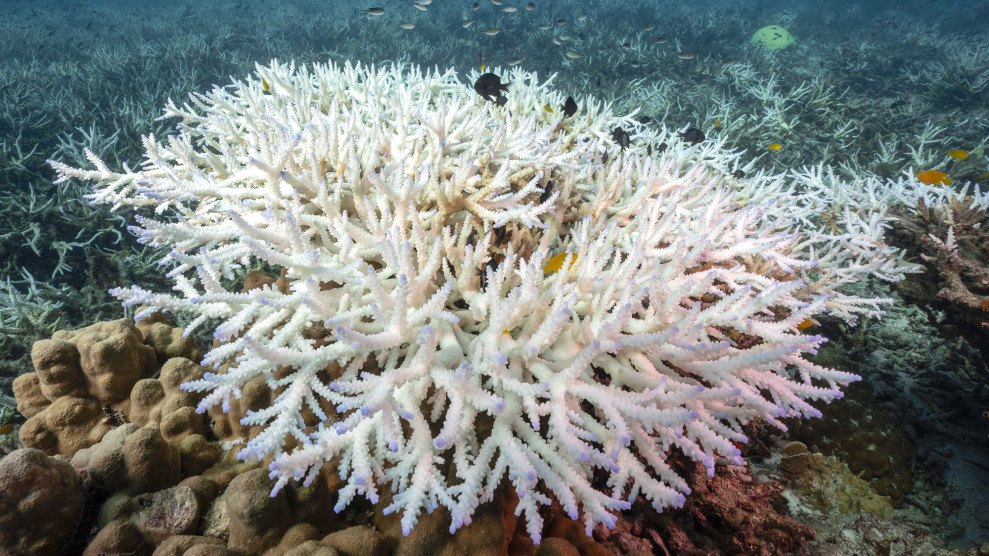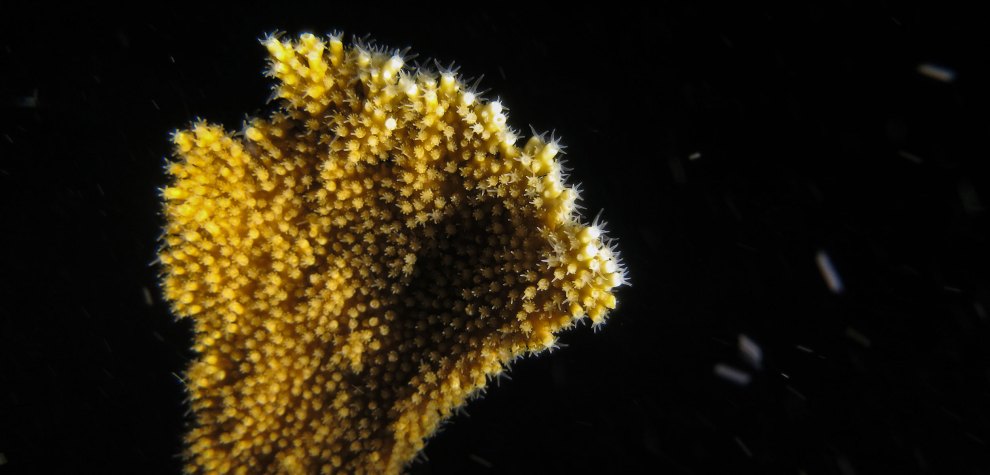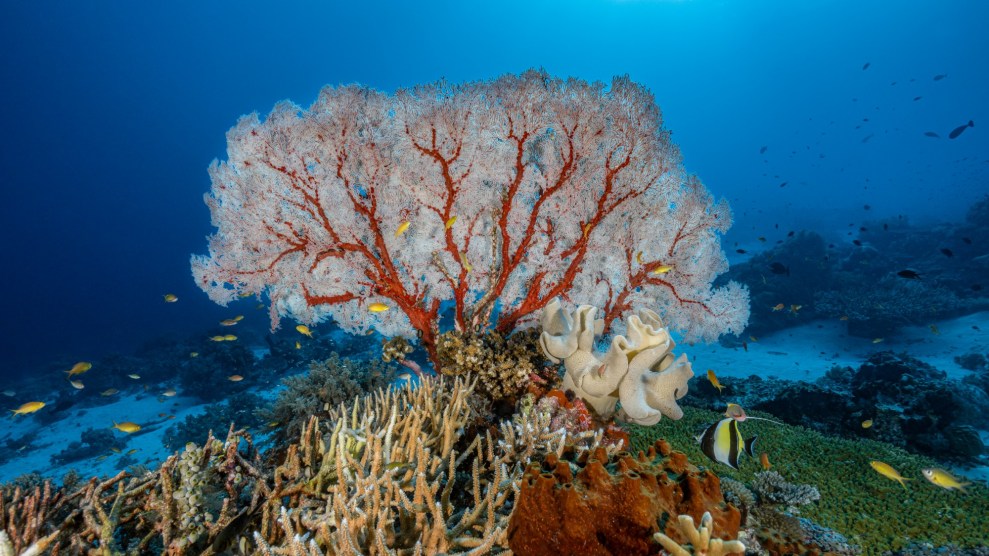
Bleached corals around Koh Tao island in the southern Thai province of Surat Thani, June 2024.Lillian Suwanrumpha/Getty Images
This story was originally published by the Guardian and is reproduced here as part of the Climate Desk collaboration.
After 18 months of record-breaking ocean temperatures, the planet’s reefs are in the middle of the most widespread heat-stress event on record.
Across the Pacific, Atlantic, and Indian oceans, latest figures from the US government’s Coral Reef Watch, shared with the Guardian, show 73 percent of the world’s corals have been hit with enough heat for them to begin bleaching.
Beginning in February 2023, this is the fourth global mass bleaching event—the second in 10 years, and the most widespread on record.
After seeing their beloved reefs struggling to survive, some coral scientists are now calling for a major rethink on how to protect reefs as temperatures climb even higher in the coming decades.
“We’re in a situation where we’re questioning if we will have reefs in many places. Is it now worth asking that question?”
“We’re coming out of a couple of decades where we made predictions,” said Prof. Tracy Ainsworth, the vice-president of the International Coral Reef Society. “Now we are at a point where we hoped we would not be. Now we’re asking, what do we do now?”
In the scientific journal Nature Climate Change, three articles were published on Monday calling on the coral conservation and science community to have a collective rethink.
“I would call it soul searching,” said Prof. Tiffany Morrison, a co-author of one of the articles that is sharply critical of widespread programs, many with corporate backers, to grow corals in nurseries and then plant them out on reefs. “When everyone realized the scale of the climate impacts on coral reefs, the first instinct was to just do something and intervene because people were so distressed.”
In Florida and the Caribbean last year, many replanted corals died as record-breaking heat stress swept across the region. “We need a fundamental rethink,” said Prof. David Bellwood, a colleague of Morrison’s at James Cook University in Australia.
“Too much is at stake. At the moment, coral restoration is at best psychological relief and cosmetic conservation, and at worst a dangerous distraction from climate action.”
Coral reefs provide food for millions of people around the world. They also provide the raw material that eventually becomes much of the sand on beaches and protect coastlines from wave damage.
When corals sit in water that is too hot, they expel algae in their tissues that provide colour and much of their nutrients.
Dr. Derek Manzello, director of Coral Reef Watch, said the number of reefs affected by heat stress from the current global event was still rising and had “definitely led to most everyone involved with reef science and restoration having a hard think about future activities and best practices.”
The current global event has affected reefs in 70 countries and the full impact may never be fully understood.
The world’s biggest coral reef system—the Great Barrier Reef—has also likely been through its worst coral bleaching event, but government scientists may not know until next year how many corals died. Whether an individual coral survives bleaching depends on each species and the extremes and duration of heat.
“I’m concerned that a problem we have with NGOs is we’re not very good at admitting to our failures.”
In another scientific article, Michael Webster, a professor at New York University suggested a radical idea which, he said, would have been far too controversial for a scientific paper only 10 years ago.
Coral reefs exist across tropical waters around the world but are adapted to local conditions. Conservationists should consider introducing corals that have evolved in very hot regions to reefs where the current mix of corals are struggling to survive, Webster said: “It’s incredibly controversial and we might not ever go there, but we’re in a situation where we’re questioning if we will have reefs in many places. Is it now worth asking that question?”
Webster said coral reefs will have a better chance of surviving through the coming decades if they have a diversity of coral species: “Getting CO2 down has to be our end game, but we have centuries where coral systems like reefs will be in trouble.”
It is interventions like that mooted by Webster that Morrison is cautious about.
There’s a vast array of scientific solutions for coral reefs currently being worked on around the world, from whitening clouds to shade reefs to selective breeding of corals for increased heat tolerance.
“We are vesting too much money and hope into these speculative coral bioengineering and genetic engineering solutions,” Morrison said. “We don’t know if they’re scalable and, if they are, whether we can afford to scale them.”
Many interventions come up against a philosophical question. Who decides which species to save or modify, or which steps to take? Those decisions could dictate what reefs look like in the future—decisions made by humans, not by nature.
“There are very few people looking at unintended consequences and there’s no governance systems in place to manage that,” Morrison said. “But number one—we have to be mitigating fossil fuels.”
Members of the International Coral Reef Society wrote in May that scientists needed to “reconsider this challenge” of protecting reefs.
Because efforts to cut global greenhouse gas emissions were too slow, governments and communities needed to redouble efforts to reduce other stressors on corals, such as overfishing and local water pollution, the society said.
Tim McClanahan, a reef ecologist and director of marine science at the US-based Wildlife Conservation Society, admitted “people are freaking out” from the current bleaching.
He said there was little evidence coral restoration projects had restored reefs at scale and in places like Florida coral nurseries had been destroyed by heat. “I think they are ignoring past experiences and not recognizing the science,” he said.
“In the ’90s I was in grief, but now I want to know how we deal with the situation.”
“I’m concerned that a problem we have with NGOs is we’re not very good at admitting to our failures. I find there’s a tendency to act without consulting the literature.”
McClanahan, in a third article in Nature Climate Change, said predicting the future for coral reefs needs to be more sophisticated.
Rather than just including heat, modelling should account for how reefs react differently to heat stress depending on local conditions like the mix of coral species or how well protected they are. The prognosis for some reefs may not be quite so dire, he argued.
McClanahan has been working on reefs for 40 years and said he has seen them go from undisturbed wonders to shadows of their former selves.
“Yes, the reefs are screwed—in deep trouble. We’re experiencing very austere conditions for corals already,” he said. “In the ’90s I was in grief, but now I want to know how we deal with the situation that we’re in. We are not dealing with it very well and we have this fatalistic view.
“We should be freaking out. That’s not an unreasonable response, but we need to sit back and be a bit more intelligent”

















